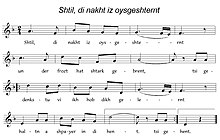
"Shtil, di nakht iz oysgeshternt" ("Quiet, the Night is Full of Stars"; Yiddish: שטיל, די נאַכט איז אױסגעשטערנט) or "Partizaner lid" ("Partisan Song") is a Yiddish song written in summer 1942 by Hirsh Glick, a young Jewish inmate of the Vilna Ghetto. It is set to a Russian folk melody.
It is a love song that starts with conventional lyrics about a quiet night and sky full of stars, but quickly turns to the realities of war. The song is addressed to a beautiful woman who succeeded in ambushing a Nazi convoy. The song celebrates Vitka Kempner, a Jewish partisan, and her successful attack, an act of sabotage, on a German train in the Vilnius sector. It was the first attack by the Fareynikte Partizaner Organizatsye (FPO), organization of Jewish partisans from the Vilna Ghetto. Kempner and Itzik Matskevich threw a hand grenade at the convoy damaging it.
The snow and frost mentioned in the lyrics are poetic liberties as the attack occurred in summer 1942. The song is noted for its celebration of a woman partisan – active fighting and resistance were not traditional roles for a woman, even during the war. Ruth Rubin also noted the use of three words – shpayer (a local word from Vilnius), nagan (a Russian term referring to Nagant M1895), and pistoyl – to denote an automatic pistol. Perhaps this was meant to show multiculturalism of the region.
It appears on Pete Seeger's We Shall Overcome - The Complete Carnegie Hall Concert., recorded June 8, 1963, under the title Schtille Di Nacht in listings.
See also
- "Zog nit keynmol", another song by Glick
References
- ^ Silverman, Jerry (2001). The Undying Flame: Ballads and Songs of the Holocaust. Syracuse University Press. pp. 96–97. ISBN 978-0-815-60708-3.
- Gilbert, Shirli (2005). Music in the Holocaust: Confronting Life in the Nazi Ghettos and Camps. Clarendon Press. p. 75. ISBN 9780199277971.
- ^ "Partisaner Lid – Partisan Song". Heartstrings: Music of the Holocaust. Yad Vashem. Retrieved 2022-01-24.
- ^ Teichman, Milton (1994). Truth and Lamentation: Stories and Poems on the Holocaust. University of Illinois Press. p. 248. ISBN 9780252063350.
- ^ Abley, Mark (2004). Spoken Here: Travels among Threatened Languages. Vintage Canada (Random House of Canada). p. 215. ISBN 9780307368232.
- Frühauf, Tina; Hirsch, Lily E. (2014). Dislocated Memories: Jews, Music, and Postwar German Culture. Oxford University Press. p. 104. ISBN 9780199367481.
- Rubin, Ruth (1979). Voices of a People: The Story of Yiddish Folksong. University of Illinois Press. p. 460. ISBN 9780252069185.